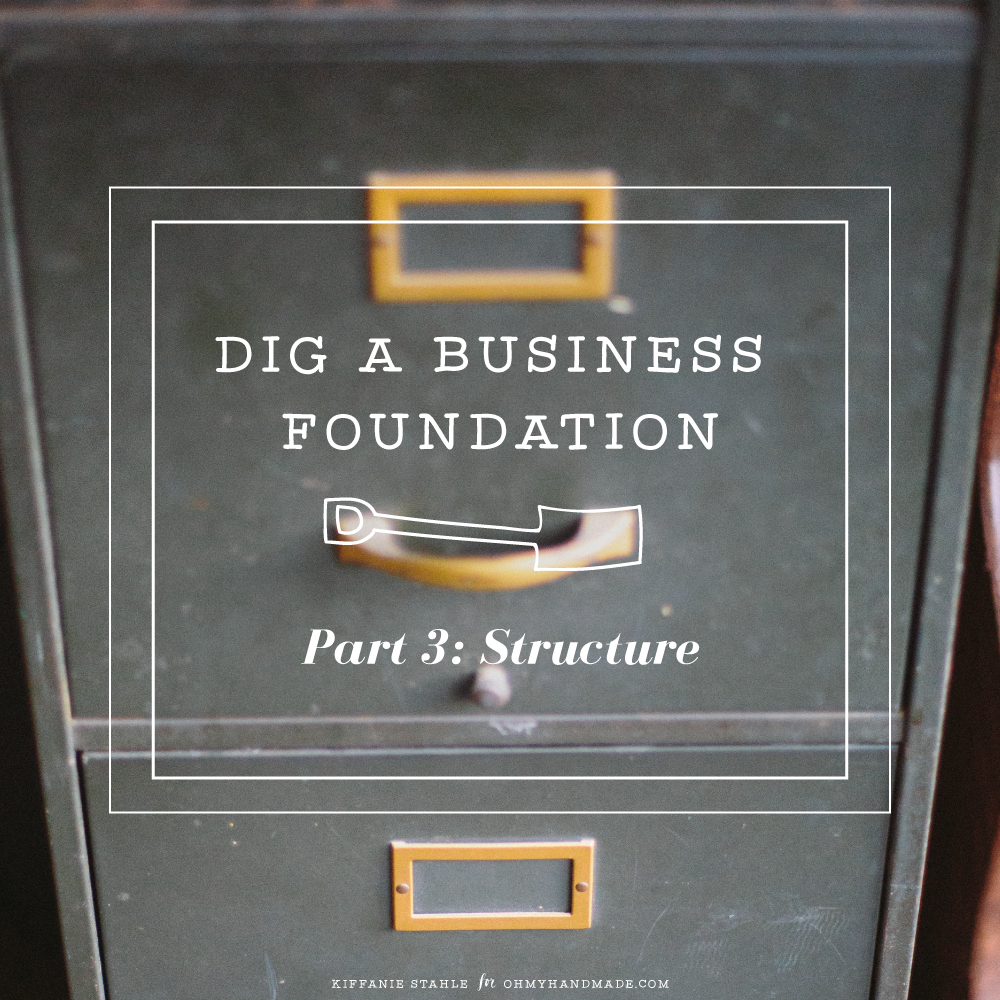

Also in this series: {Part 1: Website} | {Part 2: Contracts}
You are halfway through shoring up four critical aspects of your business foundation. Next we are going to focus on making sure your business structure is solid.
This group of tasks is my least favorite; they have very little creativity and involve lots of red tape! But I do them because keeping my business legit is my top priority, even when it involves tasks that I don’t like so much.
Business Type
Most creative business owners start by operating as a sole proprietor or a partnership. We do this because the cost is low and it’s easy to set up. Often the most difficult task in this process is a trip to City Hall to get a business license.
But as our businesses grow, operating as a sole proprietor or partnership often isn’t the best solution and many businesses opt to become a limited liability company (LLC) or a corporation. This is because of the legal concept of limited liability (Sorry, Canadians – LLCs only exist in the U.S.).
I like to think of the concept of limited liability as a fence. When in place, it puts a fence between your business life and your personal life.
Say your business gets sued. Maybe because someone slipped and fell during an open studio, because they had an allergic reaction to your products, or they took your e-course and implemented your ideas and their business tanked.
When you are operating as a sole proprietor or a partnership and they sue you and win their lawsuit, your business assets first will be used to pay the judgment. But if your business assets aren’t large enough to pay the judgment, then your personal assets must be used to make up the difference. This means that your home, your personal savings, and in some locations your spouse’s income might have to be used to pay that judgment.
However, if you are operating as an LLC or a corporation and they sue you and win their lawsuit, only your business assets can be used to pay the judgment. Your personal assets are off limits.
Determining when it’s time to make the switch is a balancing act. On one side you want to consider your risk of being sued, on the other your personal assets. If you have substantial personal assets, then even if your risk of being sued is low, changing over might be a good idea. If you have little personal assets then it would take a greater risk of being sued before the switch makes sense.
If you are not sure, pick up the phone and call your favorite attorney or accountant* and they can help walk you through how the switch will impact you and your business.
Appropriate Documents
If you are currently operating as an LLC or corporation, then pull out your business’ Operating Agreement or By-laws (If you don’t have this document, contact whomever helped you set it up and get a copy). These documents will list very specific items that you must keep in a central file. Often these are things like financial statements, tax returns, minutes of meetings, and the entity’s formation documents. Double check that you have all of the documents listed in your formation documents, and they are organized and easily accessible. If you’ve only got them electronically, make sure that they are backed-up regularly to another location or that you’ve got a printed backup.
The reason these documents are critical is they are required to keep the fence up around your business. These documents show that you are doing everything in your power to treat your business like a business, and not like your personal piggy bank. Keeping your business life separate from your personal life keeps the fence strong around your business.
Failing to keep these documents, holding meetings or other things that the Operating Agreement/By-laws require means you are poking holes in your fence. And if we poke holes, then when you get sued the opposing attorney will drive a bulldozer over your fence and your personal assets are once again up for grabs.
Licenses and Permits
Regardless of your business type, you probably need one or more license/permit to run your business. This could be as simple as a business license from your City. Or you may need a Seller’s permit so that you can purchase components at wholesale price and collect sales tax from consumers. I exclusively work with businesses in California, so this is my go-to resource for finding out what permits and licenses are required. Even if you don’t live here, it is a good jumping off point for thinking about the kinds of permits and licenses your business might need.
Team
At some point in your business, you’ll have to hire a team. If you are there, congratulations! This is a huge step.
As a business owner, hiring someone as an independent contractor and not as an employee sounds appealing. It eliminates the need for payroll, taxes, and worker’s compensation insurance. But calling someone by the wrong “name” can result in a huge tax bill and fines.
The rules vary a little country to country, but they all come down to the same principle: control.
They are an employee if you control how the work is done, what equipment they can use, and when they can do it. If they have the freedom to decide how to get to the final outcome, they use their own supplies, and they can do it at 2am or at 3pm; they are likely an independent contractor.
If you’ve currently got any independent contractors, evaluate who is the boss: you or them. And if you are, then switch them over to an employee.
Print out the worksheet by clicking here or on the image above and pull out any business structure documents you can find: employee agreements, independent contractor agreements, formation documents, licenses, and permits.
As you work through the worksheet think about if any gaps exist between where your business is and where you want it to be. Maybe you need to talk to your CPA about switching over to a LLC, or you need to block off time to get your LLC paperwork in order. If you’ve got any gaps, take out your calendar and block off time to tackle these not-so-fun tasks.
Congrats! You’ve solidified your business foundation by getting your business structure secure. I’d love to know in the comments below the first gap you are going to tackle. Or if you are all squared away, let us know so we can give you a high five.
Kiffanie Stahle | The artist’s JD
 Kiffanie Stahle is a lawyer, photographer, and small business owner. In April 2014, she created the artist’s JD, a place where creative business owners can get the tools and resources they need to tackle the legal aspects of their businesses. Kiffanie believes that the law doesn’t have to be scary or hard to understand. And she knows this to be true because she’s been practicing law since 2011. When Kiffanie is not creating art or running her business, you might find her concocting something in the kitchen, soaking up the sun, or plotting her next adventure.
Kiffanie Stahle is a lawyer, photographer, and small business owner. In April 2014, she created the artist’s JD, a place where creative business owners can get the tools and resources they need to tackle the legal aspects of their businesses. Kiffanie believes that the law doesn’t have to be scary or hard to understand. And she knows this to be true because she’s been practicing law since 2011. When Kiffanie is not creating art or running her business, you might find her concocting something in the kitchen, soaking up the sun, or plotting her next adventure.
WEBSITE | FACEBOOK | TWITTER | INSTAGRAM
This is part 3 of a 4 part series publishing every Thursday in January to help you dig a solid foundation for your business in 2015! Mark your calendars for a special Q & A#OMHG chat with Kiffanie on Twitter, January 29th from 1-2pm EST.
Also in this series: {Part 1: Website} | {Part 2: Contracts}



[…] shoring up your business foundations. We talked about getting your website, contracts, structure, and intellectual property shored […]